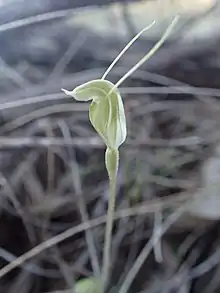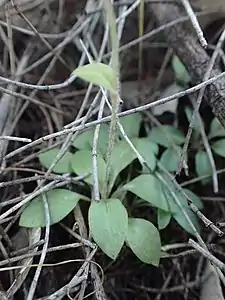| Hairy-leafed snail orchid | |
|---|---|
 | |
| Pterostylis echinulata growing in Beverley | |
| Scientific classification | |
| Kingdom: | Plantae |
| Clade: | Tracheophytes |
| Clade: | Angiosperms |
| Clade: | Monocots |
| Order: | Asparagales |
| Family: | Orchidaceae |
| Subfamily: | Orchidoideae |
| Tribe: | Cranichideae |
| Genus: | Pterostylis |
| Species: | P. echinulata |
| Binomial name | |
| Pterostylis echinulata | |
Pterostylis echinulata, commonly known as the hairy-leafed snail orchid, is a species of orchid endemic to the south-west of Western Australia. Both flowering and non-flowering plants have a compact rosette of leaves flat on the ground and flowering plants have a single pale yellowish-green flower.

Description
Pterostylis echinulata is a terrestrial, perennial, deciduous, herb with an underground tuber and a compact rosette of leaves 5–20 mm (0.2–0.8 in) in diameter. Flowering plants have a single pale yellowish-green flower 9–11 mm (0.4–0.4 in) long and 5–8 mm (0.2–0.3 in) wide on a densely hairy flowering stem 40–80 mm (2–3 in) high. There is a single stem leaf 6–8 mm (0.2–0.3 in) long and 3–4 mm (0.1–0.2 in) wide on the flowering stem. The dorsal sepal and petals are fused, forming a slightly inflated hood or "galea" over the column. The lateral sepals are held close to the galea almost closing the front of the flower and have erect, thread-like tips 14–17 mm (0.6–0.7 in) long. The labellum is broad but not visible from outside the flower. Flowering occurs in June and July.[2][3]
Taxonomy and naming
Pterostylis echinulata was first formally described in 2014 by David Jones and Christopher French from a specimen collected near Kulin and the description was published in Australian Orchid Review. The species had previously been known as Pterostylis sp. 'hairy leaf'.[4] The specific epithet (echinulata) is a Latin word meaning "with very small prickles, alluding to the impression imparted by the siliceous cells present on the leaves, scape and ovary of this species".[4]
Distribution and habitat
The hairy-leafed snail orchid grows under small shrubs in open woodland in the Mallee biogeographic region.[2][5]
Conservation
Pterostylis echinulata is classified as "Priority One" by the Western Australian Government Department of Parks and Wildlife,[5] meaning that it is known from only one or a few locations which are potentially at risk.[6]
References
- ↑ "Pterostylis echinulata". World Checklist of Selected Plant Families (WCSP). Royal Botanic Gardens, Kew.
- 1 2 Brown, Andrew; Dixon, Kingsley; French, Christopher; Brockman, Garry (2013). Field guide to the orchids of Western Australia : the definitive guide to the native orchids of Western Australia. Simon Nevill Publications. p. 360. ISBN 9780980348149.
- ↑ Hoffman, Noel; Brown, Andrew (2011). Orchids of South-West Australia (3rd ed.). Gooseberry Hill: Noel Hoffman. p. 411. ISBN 9780646562322.
- 1 2 "Pterostylis echinulata". APNI. Retrieved 26 July 2017.
- 1 2 "Pterostylis echinulata". FloraBase. Western Australian Government Department of Biodiversity, Conservation and Attractions.
- ↑ "Conservation codes for Western Australian Flora and Fauna" (PDF). Government of Western Australia Department of Parks and Wildlife. Retrieved 12 May 2020.
